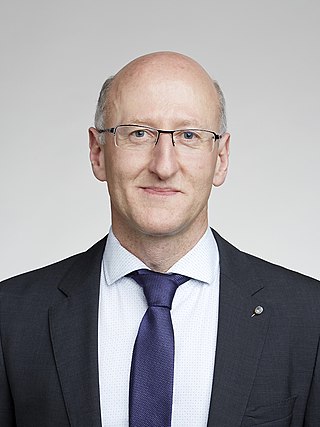
Sir Richard Timothy Hunt, is a British biochemist and molecular physiologist. He was awarded the 2001 Nobel Prize in Physiology or Medicine with Paul Nurse and Leland H. Hartwell for their discoveries of protein molecules that control the division of cells. While studying fertilized sea urchin eggs in the early 1980s, Hunt discovered cyclin, a protein that cyclically aggregates and is depleted during cell division cycles.

Kim Ashley Nasmyth is an English geneticist, the Whitley Professor of Biochemistry at the University of Oxford, a Fellow of Trinity College, Oxford, former scientific director of the Research Institute of Molecular Pathology (IMP), and former head of the Department of Biochemistry, University of Oxford. He is best known for his work on the segregation of chromosomes during cell division.
John Graham White is an Emeritus Professor of Anatomy and Molecular Biology at the University of Wisconsin–Madison. His research interests are in the biology of the model organism Caenorhabditis elegans and laser microscopy.
Gillian Patricia Bates FMedSci FRS is a British biologist. She is distinguished for her research into the molecular basis of Huntington's disease and in 1998 was awarded the GlaxoSmithKline Prize as a co-discoverer of the cause of this disease. As of 2016, she is Professor of Neurogenetics at UCL Institute of Neurology and the co-director of UCL Huntington's Disease Centre.
Christopher John Marshall FRS FMedSci was a British scientist who worked as director of the Division for Cancer Biology at the Institute of Cancer Research. Marshall was distinguished for research in the field of tumour cell signalling. His track record includes the discovery of the N-Ras oncogene , the identification of farnesylation of Ras proteins, and the discovery that Ras signals through the MAPK/ERK pathway. These findings have led to therapeutic development of inhibitors of Ras farnesylation, MEK and B-Raf.

Sir Melvyn Francis Greaves FMedSci, FRS is a British cancer biologist, and Professor of Cell Biology at the Institute of Cancer Research (ICR) in London. He is noted for his research into childhood leukaemia and the roles of evolution in cancer, including important discoveries in the genetics and molecular biology underpinning leukaemia.
Edith Heard is a British-French researcher in epigenetics and since January 2019 has been the Director General of the European Molecular Biology Laboratory (EMBL). She is also Professor at the Collège de France, holding the Chair of Epigenetics and Cellular Memory. From 2010 to 2018, Heard was the Director of the Genetics and Developmental Biology department at the Curie Institute (Paris), France. Heard is noted for her studies of X-chromosome-inactivation.

Sir James Cuthbert Smith is Director of Science at the Wellcome Trust, Senior Group Leader at the Francis Crick Institute and President of the Council at Zoological Society of London.

Frank Uhlmann FRS is a group leader at the Francis Crick Institute in London.
Sir Hugh Reginald Brentnall Pelham, is a cell biologist who has contributed to our understanding of the body's response to rises in temperature through the synthesis of heat shock proteins. He served as director of the Medical Research Council (MRC) Laboratory of Molecular Biology (LMB) between 2006 and 2018.

Jonathon Noë Joseph Pines is Head of the Cancer Biology Division at the Institute of Cancer Research in London. He was formerly a senior group leader at the Gurdon Institute at the University of Cambridge.

Richard Paul Harvey is a molecular biologist, the Sir Peter Finley professor of Heart Research at the University of New South Wales and Deputy Director and Head of the Developmental and Stem Cell Biology Division at the Victor Chang Cardiac Research Institute.
Duncan Odom is a research group leader at the German Cancer Research Center (DKFZ) in Heidelberg, and the Cancer Research UK Cambridge Institute at the University of Cambridge. Previously he was as an associate faculty member at the Wellcome Trust Sanger Institute from 2011 to 2018.
James Briscoe is a senior group leader at the Francis Crick Institute in London and editor-in-chief of the journal Development.

Sir Richard Henry Treisman is a British scientist specialising in the molecular biology of cancer. Treisman is a director of research at the Francis Crick Institute in London.

Neil Alexander Steven Brockdorff is a Wellcome Trust Principal Research Fellow and professor in the department of biochemistry at the University of Oxford. Brockdorff's research investigates gene and genome regulation in mammalian development. His interests are in the molecular basis of X-inactivation, the process that evolved in mammals to equalise X chromosome gene expression levels in XX females relative to XY males.

Richard A. Dixon is distinguished research professor at the University of North Texas, a faculty fellow of the Hagler Institute of Advanced Study and Timothy C. Hall-Heep distinguished faculty chair at Texas A&M University.
Caetano Maria Pacheco Pais dos Reis e Sousa is a senior group leader at the Francis Crick Institute and a professor of Immunology at Imperial College London.
Richard M. Harland is CH Li Distinguished Professor of Genetics, Genomics and Development at the University of California, Berkeley.
François Guillemot,, is a French neurobiologist, currently working at the Francis Crick Institute in London. His research focuses on the behaviour of neural stem cells in embryos and adult brains.










